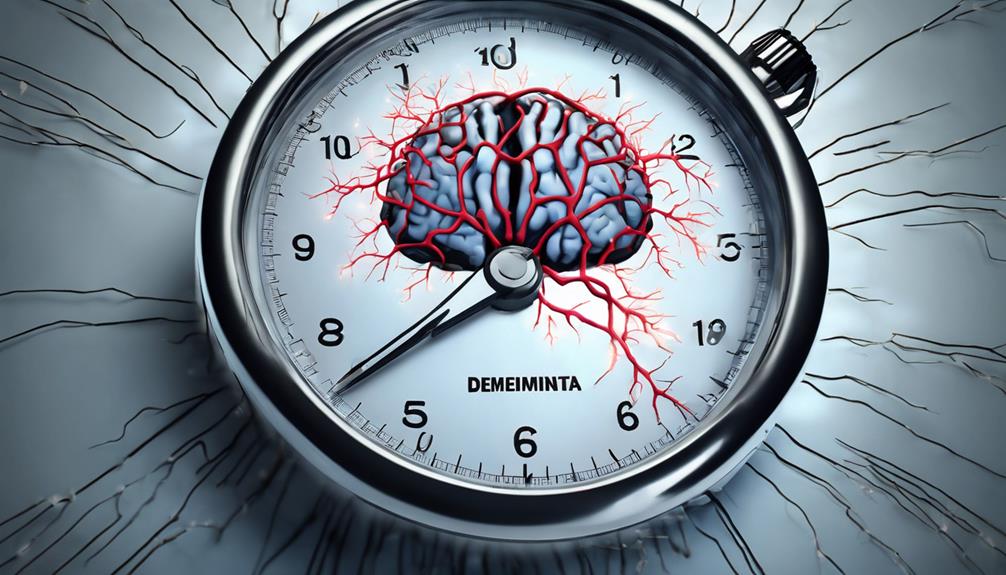Understanding the components of nursing diagnosis is essential in the complex task of providing care for individuals with dementia.
As we navigate the complexities of assessing, understanding, and addressing the needs of individuals with dementia, a nuanced approach becomes imperative.
The interplay of cognitive decline, emotional distress, and behavioral manifestations requires a delicate balance.
Let's explore how these intricacies shape the foundation of effective care for patients with dementia, guiding us towards tailored interventions and improved outcomes.
Key Takeaways
- Thorough cognitive evaluation crucial for dementia diagnosis accuracy.
- Tailored interventions promote safety, independence, and emotional support.
- Regular monitoring and adjustments essential for tracking progress and modifying care plans.
- Collaborative team approach vital for holistic, individualized dementia care.
Understanding Dementia Nursing Diagnosis
Exploring the complexities of dementia nursing diagnosis reveals a profound need for compassionate understanding and meticulous assessment to provide optimal care for individuals with cognitive impairments. When it comes to nursing diagnosis for dementia, it's crucial to identify risks such as trauma, violence, confusion, self-care deficit, and falls. Clinical assessment plays a vital role in this process, involving psychiatric interviews and serial evaluations to determine the client's cognitive status accurately.
Nursing care planning is centered around promoting reality-based thinking, fostering client acceptance, and ensuring safety in the environment. Interventions are geared towards orienting the client, providing positive reinforcement, actively involving caregivers, and simplifying communication for better comprehension. Evaluation criteria focus on the client's ability to differentiate between reality and non-reality based thinking, as well as caregivers verbalizing effective ways to orient clients.
In essence, understanding dementia nursing diagnosis requires a holistic approach that prioritizes safety, reality-based care, and active involvement of caregivers in the care planning and intervention process.
Assessment for Dementia Diagnosis

How can a comprehensive assessment contribute to accurately diagnosing dementia in individuals experiencing cognitive impairments? When assessing for dementia diagnosis, it is essential to conduct a thorough evaluation of cognitive function, memory, behavior, and daily living activities. Utilizing standardized cognitive assessment tools like the Mini-Mental State Examination (MMSE) or Montreal Cognitive Assessment (MoCA) can provide valuable insights into the individual's cognitive status. Additionally, evaluating for reversible causes of cognitive decline, such as vitamin deficiencies or thyroid dysfunction, is crucial in the assessment process to rule out any underlying conditions that may mimic dementia symptoms. Involving family members or caregivers in the assessment can offer a holistic view of the individual's changes in cognition and behavior, aiding in a more accurate diagnosis. Collaborating with a multidisciplinary team, including neurologists, psychiatrists, and neuropsychologists, can further confirm a diagnosis of dementia through various assessments and tests.
| Assessment Tools | Importance | Role |
|---|---|---|
| MMSE/MoCA | Cognitive evaluation | Determine cognitive impairment levels |
| Reversible Causes Check | Rule out underlying issues | Identify conditions mimicking dementia |
| Family/Caregiver Input | Holistic perspective | Provide insights into daily changes |
Implementing Nursing Interventions
In dementia care, our nursing interventions aim to create a structured routine that supports cognitive function and reduces confusion for individuals experiencing cognitive impairments. To effectively implement nursing interventions for patients with dementia, we focus on the following key aspects:
- Maintaining a Safe Environment: By removing hazards and providing supervision, we strive to prevent accidents and ensure the safety of our patients.
- Assistive Devices and Adaptive Equipment: Encouraging the use of these tools promotes independence and enhances safety for individuals with dementia.
- Emotional Support and Communication Strategies: Tailoring our approaches to meet the unique needs of each patient is crucial for providing the necessary emotional support and effective communication.
- Caregiver Education and Training: Equipping caregivers with knowledge on dementia management and behavioral strategies is essential for successful implementation of nursing interventions.
- Promoting Consistent Daily Routine: Establishing a predictable daily schedule helps reduce confusion and provides a sense of stability for individuals with dementia.
Monitoring Progress and Adjustments

As we implement nursing interventions for individuals with dementia, it becomes imperative to regularly reassess their cognitive and functional status to monitor changes and progress in dementia management. By conducting thorough cognitive assessments and evaluating their functional status, we can track the effectiveness of our interventions over time.
Documenting any improvements or deteriorations in the patient's condition is crucial for understanding the impact of our care strategies. Collaborating with the interdisciplinary team is essential to review and modify the care plan as needed, ensuring a holistic approach to dementia care.
Care plan modifications should be made based on the patient's evolving needs and responses to care, aiming to optimize outcomes and enhance the quality of life for individuals with dementia. Educating caregivers on how to recognize signs of progress or setbacks in the patient's condition is vital for their active involvement in the care process.
Together, through progress tracking and adjustments, we can provide comprehensive and compassionate dementia care.
Collaborative Care in Dementia Treatment
Together, our collaborative approach in dementia treatment involves a multidisciplinary team of healthcare professionals dedicated to optimizing the quality of life for individuals with dementia through individualized care plans tailored to their specific needs and preferences. This collaborative care model ensures that every aspect of a patient's well-being is addressed, encompassing not just their cognitive health but also their emotional and social needs.
Communication and coordination among team members are paramount in providing comprehensive care and support for both patients and their families. By integrating various perspectives and expertise, our goal is to enhance the overall management of Alzheimer's Disease and other forms of dementia, creating a holistic approach to care that considers the unique challenges each patient faces.
Our commitment to individualized care plans allows us to tailor interventions to suit the specific requirements of each patient, fostering a compassionate and supportive environment for those living with dementia.
- Multidisciplinary Team Approach
- Individualized Care Plans
- Comprehensive Care Model
- Emphasis on Communication and Coordination
- Holistic Approach to Dementia Care
Frequently Asked Questions
What Is a Nursing Diagnosis for Dementia?
When addressing dementia, it's vital to consider various nursing diagnoses to provide comprehensive care. Evaluating risks of injury, self-care deficits, impaired memory, and altered thought processes are essential components. These assessments guide us in tailoring individualized care plans to meet the unique needs of each patient.
What Is a Nanda Nursing Diagnosis for Cognitive Impairment?
When addressing cognitive impairment, one key NANDA nursing diagnosis is 'Impaired Memory' due to neurological changes, impacting daily function and quality of life.
Another relevant diagnosis is 'Confusion' stemming from altered cognitive abilities. These diagnoses guide tailored care plans to support patients with cognitive deficits and enhance safety.
Accurate identification of these issues is vital for effective care and improved patient outcomes. NANDA diagnoses offer a structured approach to handling cognitive impairment in individuals.
Can a Nurse Diagnose Dementia?
Yes, we can't definitively diagnose dementia, but we play a crucial role in assessing and identifying signs that may indicate its presence.
Through comprehensive assessments and collaboration with healthcare providers, we focus on cognitive function, memory loss, behavior changes, and functional abilities.
Using standardized tools, we contribute valuable information for a dementia diagnosis, enabling timely interventions and support for patients and families facing its challenges.
What Are the Five Nursing Diagnosis?
When we consider nursing diagnoses, it's crucial to assess the individual comprehensively. We identify potential concerns and create care plans tailored to their needs.
By addressing issues like risk for injury, impaired communication, self-care deficits, social isolation, and anxiety, we can provide holistic care for those facing cognitive challenges.
Our goal is to support each person in living their best quality of life despite the difficulties they may encounter.
Conclusion
In conclusion, dementia nursing diagnosis is crucial for providing personalized care to individuals living with dementia. By conducting thorough assessments and implementing tailored interventions, we can enhance their quality of life and ensure their safety.
Did you know that approximately 50 million people worldwide are living with dementia, with this number expected to triple by 2050? It's imperative that we continue to prioritize dementia care to support those affected by this condition.









